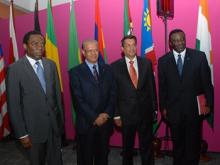The International Conference on Diabetes opens with urgent calls for action
Port Louis, 12 November 2009 -- The International Conference on Diabetes and Associated Diseases opened today in Mauritius with calls for action to address diabetes which is already having a tremendous impact on the life and health of millions of individuals, families and communities in many parts of the world.
Addressing delegates at the conference, His Excellency Dr The Honourable Navinchandra Ramgoolam, Prime Minister of Mauritius said that diabetes is an epidemic that is exploding across the world. He pointed out that the holding of this conference is in line with the call for the African region to respond to this epidemic which is a serious challenge to the attainment of internationally agreed development goals.
Dr Ramgoolam cited several measures that have been put in place in Mauritius to fight diabetes particularly the legislations on prohibition of tobacco use in certain defined areas and reduction in harmful use of alcohol, launching of mobile clinics for screening, banning of soft drinks in schools, setting up of health clubs in the country. He called on delegates to share experiences and work in collaboration across all sectors to tackle the growing problem of diabetes.
The conference aims at sharing best practices in diabetes prevention and control and is being attended by more than 300 delegates including, among others, experts, policy makers, academics and non-governmental organisations.
In his opening address, Dr Luis Gomes Sambo, the WHO Africa Regional Director, underscored the importance of access to health care; health education, information and communication; social mobilization and the effective implementation of regional and national plans to address the epidemic of chronic diseases.
Dr Sambo pointed out that changes in lifestyles of Africans have brought a change in the pattern of diseases in Africa with chronic diseases becoming increasingly prevalent in all countries to date.
"This has created an epidemiological profile characterised by double burden of communicable and non-communicable diseases and many countries are unable to effectively deal with the current situation because of inadequate policies and resource constraints", he said.
Referring to Type 2 Diabetes which represents about 90 per cent of people with diabetes, the Regional Director stressed that its prevention requires public policies that promote healthy lifestyles such as healthy diets and physical activity, without neglecting the importance of safe behaviours related to harmful use of alcohol and smoking in particular.
"But public policies alone are not enough. Families and individuals must also be involved by having the right information to guide their choices about lifestyles and behaviours that promote their own health", he added.
Dr Sambo also appealed to African governments to accelerate efforts in mobilizing national and external resources to meet the requirements for adequate implementation of national programmes for the prevention and control of diabetes.
Professor Jean-Claude Mbanya, President of the International Diabetes Federation pointed out that diabetes has become a development issue which threatens health and economic prosperity in low and middle income countries. He emphasized that no country is immune to diabetes and has yet managed to reverse the trend of rising prevalence.
"Defeating diabetes will take every ounce of commitment and ingenuity that we can summon, It is time to think creatively and to break paradigms:", he added.
The three-day conference will focus on: wide ranging diabetes related issues. culminating in the adoption of Mauritius Call to Action on Diabetes and Associated Diseases.
pr20091112
For more information, please contact :
Media Contacts : Collins Boakye-Agyemang, Flavienne Issembé, Devan Mohee, Souleymane Koné, Henry Bastienne, José Dacosta Caetano, to the following numbers: +230 7806478 ; 7649665 ; 2539387; 7649533
Technical Contacts: Dr A.J. Diarra-Nama et Dr Boureima Hama Sambo to the following number: +230 7513131




